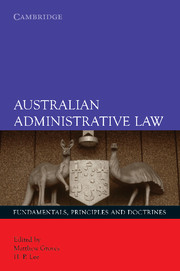Book contents
- Frontmatter
- Contents
- Foreword
- Preface
- About the contributors
- Table of cases
- Table of statutes
- 1 Australian administrative law: The constitutional and legal matrix
- 2 Administrative law in Australia: Themes and values
- 3 The public/private distinction in Australian administrative law
- 4 Australian administrative law: The human rights dimension
- 5 Administrative tribunals
- 6 Australian Ombudsman: A continual work in progress
- 7 Freedom of information
- 8 Delegated legislation
- 9 The concept of ‘justiciability’ in administrative law
- 10 Standing
- 11 Reasons for administrative decisions: Legal framework and reform
- 12 Relevant and irrelevant considerations
- 13 Improper purpose
- 14 Reasonableness, rationality and proportionality
- 15 The ‘no evidence’ rule
- 16 Failure to exercise discretion or perform duties
- 17 Procedural fairness: The hearing rule
- 18 The doctrine of substantive unfairness and the review of substantive legitimate expectations
- 19 The impact and significance of Teoh and Lam
- 20 The rule against bias
- 21 Jurisdictional error without the tears
- 22 Privative clauses and the limits of the law
- 23 Administrative law judicial remedies
- Endnotes
- Index
4 - Australian administrative law: The human rights dimension
Published online by Cambridge University Press: 05 June 2012
- Frontmatter
- Contents
- Foreword
- Preface
- About the contributors
- Table of cases
- Table of statutes
- 1 Australian administrative law: The constitutional and legal matrix
- 2 Administrative law in Australia: Themes and values
- 3 The public/private distinction in Australian administrative law
- 4 Australian administrative law: The human rights dimension
- 5 Administrative tribunals
- 6 Australian Ombudsman: A continual work in progress
- 7 Freedom of information
- 8 Delegated legislation
- 9 The concept of ‘justiciability’ in administrative law
- 10 Standing
- 11 Reasons for administrative decisions: Legal framework and reform
- 12 Relevant and irrelevant considerations
- 13 Improper purpose
- 14 Reasonableness, rationality and proportionality
- 15 The ‘no evidence’ rule
- 16 Failure to exercise discretion or perform duties
- 17 Procedural fairness: The hearing rule
- 18 The doctrine of substantive unfairness and the review of substantive legitimate expectations
- 19 The impact and significance of Teoh and Lam
- 20 The rule against bias
- 21 Jurisdictional error without the tears
- 22 Privative clauses and the limits of the law
- 23 Administrative law judicial remedies
- Endnotes
- Index
Summary
Public officials and government agencies possess wide and often discretionary powers which profoundly affect the rights and liberties of people in Australia. In the absence of an Australian statutory or constitutional Bill of Rights, it is inevitable that human rights claims will attempt to infiltrate existing branches of Australian law and clothe themselves in their language and causes of action. On one hand, writing about the human rights dimension of Australian administrative law is like writing about the human rights dimension of the law of torts, contract or crime. Every branch of law has incidental effects on the protection or infringement of human rights, whether by constraining or enabling actions which affect other people.
Administrative law is, however, particularly vulnerable to the permeation of human rights claims, since, like human rights law, it primarily constrains the exercise of public power, often in controversial areas of public policy, with a shared focus on the fairness of procedure and an emphasis on the effectiveness of remedies. Nowhere is this trend more apparent than in decisions about refugee status, where failed applicants have often sought judicial review to advance what are essentially human rights claims. The perceived generosity of the courts in the migration area, through an expansion of the scope of natural justice and other grounds of judicial review, and a blurring of the legality/merits distinction, provoked a series of political attempts (not always successful) to restrict the quality or availability of review.
- Type
- Chapter
- Information
- Australian Administrative LawFundamentals, Principles and Doctrines, pp. 50 - 76Publisher: Cambridge University PressPrint publication year: 2007
- 3
- Cited by



